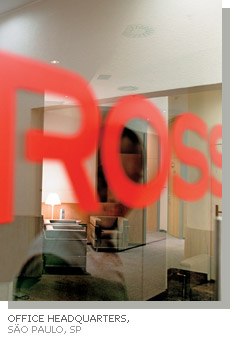
Rossi strives to improve its corporate governance model, with shareholders, family and executives in ideal synchronization while satisfying the requirement for transparency in the rendering of accounts, the equal treatment of shareholders and the continuous professionalizing of management. The most important decisions are taken collectively, based on detailed studies. In 2007 a number of important actions were adopted that sought to enhance the company’s good corporate practices.
Board Reformulation
The Board of Directors, which currently has two independent members, is being reformulated. This work includes the implementation of Internal Board Rules, the definition of the new in-company and independent members, the follow-up of Board meetings with the definition of critical topics for discussion and the creation of a system to monitor performance and risks for shareholders. Herbert Steinberg’s MESA Corporate Governance consulting firm is conducting the process.
Family succession
Family succession has been under planning since 2004 by the Renê Werner e Associados company. This project, currently in a final phase, is designed to create a company structure that ensures stable rules regarding family transition, obeying the principle of the perpetuity of the businesses.
Succession plan and evaluation of management
Also foreseen as part of the scope of the work by MESA Consultoria is the introduction of a backup system for directors and managers who occupy key positions, through the definition of the necessary competencies for each top manager’s job description. A differentiated assessment system also will be designed to permit the Board to be able to evaluate the adjustment of each executive to his or her position and, through this, propose individual development plans.
Executive Business Committee
This committee was created to approve land purchases. It analyzes strategic information such as the feasibility study of a project, expected profitability and the risks that are involved. It is made up of members of the corporate executive board, some members of the Board of Directors and representatives from the Regional Offices who are for proposing the acquisitions.
Executive Financial Committee
The Financial Committee’s job is to manage the company’s cash flow, assessing the impact of the new land investments approved by the Business Committee and evaluating funding alternatives that are available. Members of the executive board, the Board of Directors, the director of Finance, the financial manager and the controller sit on this committee. It holds monthly meetings.
Executive Legal Committee
Meets weekly and made up of representatives of the Legal Department, the Sales director and a member of the Board of Directors, its job is to examine proposals for the purchase of land, to check the legal and property ownership situation of the properties and to analyze the risks that are involved. As a result, it can approve or veto the acquisition of land based on legal criteria.

Executive Project Launch Committee
Through the use of a feasibility study for the launch of each project, the marketing budget, the construction budget and the proposed sales price list, this committee reviews the assumptions that had been used by the Business Committee to confirm the project profitability expectations. This committee meets on a weekly basis.
Project follow-up meetings
The corporate executive board holds monthly meetings with each Regional Office to evaluate compliance with sales targets, launches and results. It also analyzes the performance of each project, comparing the forecasts to actual results, the inventory of finished units, any payment defaults and the overall construction operation, among other indicators. These meetings supply data for the general meeting attended also by members of the Board, during which the company’s consolidated indicators are analyzed.
Accounting standards
As one of the first companies in the Brazilian real estate sector to go public, Rossi has accumulated substantial experience regarding the adopting of accounting practices that are in line with the regulations of the Securities and Exchange Commission (CVM). Rossi was also one of the first real estate companies to make its accounting statements available in compliance with international standards (USGAAP), and satisfying the regulations of the Novo Mercado (New Market), the highest corporate governance level of the São Paulo Stock Exchange (BOVESPA).
Stock Option Plan
Rossi’s executive compensation strategy includes a long-term incentive program designed to retain its professionals, seeking their commitment to future results and rewarding them for good long-term corporate performance. A specialized consulting company was hired, the Hay Group, which surveyed market practices and proposed alternatives for designing long-term incentives.
Profit Sharing Program
The company’s Profit Sharing Program is related to the performance of each area regarding meeting targets and results established for the year. The company distributes a percentage of its net accounting profit to all employees, except for trainees, temporary workers, specific-period contract employees, autonomous workers and outsourced workers.



